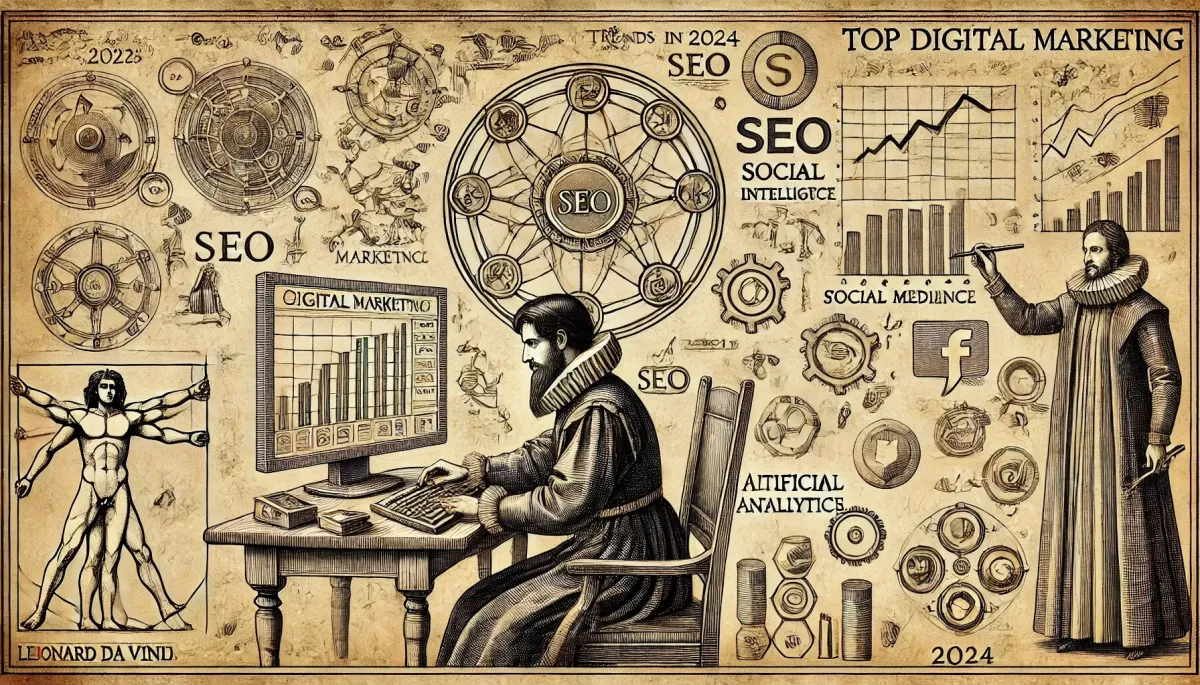
Top Digital Marketing Trends in 2024
Top Digital Marketing Trends in 2024
In the ever-evolving landscape of digital marketing, staying ahead of the curve is not just a competitive advantage—it’s a necessity. As we venture into 2024, the digital marketing world is set to undergo transformative changes, driven by advancements in technology, shifts in consumer behavior, and the relentless march towards greater personalization and engagement. Here at The Fogg Agency, we believe that understanding these trends is crucial for any business looking to thrive in the digital age. So, let’s delve into the top digital marketing trends that will dominate 2024.
The Ascendancy of Artificial Intelligence
Artificial Intelligence (AI) is not merely a buzzword; it’s a profound technological force reshaping the digital marketing landscape. By 2024, AI will be more deeply integrated into marketing strategies, enhancing everything from customer service to content creation.
AI-Driven Personalization
Personalization will reach new heights with AI. Advanced algorithms will analyze consumer data to deliver hyper-personalized content and recommendations. This level of customization will extend to email marketing, website experiences, and even product suggestions, ensuring that consumers receive relevant and engaging interactions at every touchpoint.
Predictive Analytics
Predictive analytics, powered by AI, will enable marketers to forecast future consumer behaviors and trends with unprecedented accuracy. By analyzing historical data and identifying patterns, businesses can make informed decisions, optimize their marketing strategies, and anticipate customer needs before they arise.
The Rise of Voice Search and Smart Speakers
Voice search is poised to revolutionize how consumers find information and interact with brands. With the proliferation of smart speakers like Amazon Echo and Google Home, voice search will become a dominant force in digital marketing.
Optimizing for Voice Search
Marketers must adapt their SEO strategies to accommodate voice search queries, which are often longer and more conversational than text searches. This involves focusing on natural language processing, optimizing for question-based queries, and ensuring that local search results are voice-search friendly.
Voice-Activated Shopping
Voice-activated shopping will become more prevalent as consumers grow accustomed to making purchases through smart speakers. Brands need to streamline their voice commerce processes, ensuring that their products are easily discoverable and purchasable via voice commands.
The Evolution of Social Media
Social media platforms are continuously evolving, and 2024 will see significant changes in how brands leverage these platforms to engage with their audiences.
Short-Form Video Content
Short-form video content, popularized by platforms like TikTok and Instagram Reels, will dominate social media marketing. Brands must create engaging, bite-sized videos that capture attention quickly and convey their message effectively. These videos should be authentic, entertaining, and tailored to the platform’s unique audience.
Social Commerce
Social commerce, the integration of shopping features within social media platforms, will continue to grow. Platforms like Instagram, Facebook, and Pinterest are enhancing their shopping capabilities, allowing users to discover and purchase products without leaving the app. Brands should optimize their social media profiles for commerce, making it easy for users to shop directly from their posts and stories.
The Importance of Data Privacy and Ethical Marketing
As consumers become more aware of data privacy issues, ethical marketing practices will take center stage in 2024.
Transparent Data Practices
Brands must prioritize transparency in their data practices, clearly communicating how they collect, use, and protect consumer data. Building trust through transparent data practices will be essential for maintaining customer loyalty and complying with increasingly stringent data protection regulations.
Ethical AI and Marketing Automation
The use of AI and marketing automation should be guided by ethical principles. Brands must ensure that their AI systems are free from biases and that automated processes do not compromise consumer privacy or lead to manipulative practices. Ethical AI will be a cornerstone of responsible and sustainable marketing.
The Integration of Augmented Reality (AR)
Augmented Reality (AR) will become a powerful tool for enhancing customer experiences and driving engagement.
AR-Powered Shopping Experiences
AR technology will enable consumers to visualize products in their real-world environment before making a purchase. From trying on virtual clothing to visualizing furniture in their home, AR will bridge the gap between online and offline shopping experiences, making it easier for consumers to make informed buying decisions.
Interactive AR Campaigns
Brands will leverage AR to create interactive and immersive marketing campaigns. These campaigns can engage consumers in unique and memorable ways, fostering deeper connections with the brand. For example, AR filters on social media can encourage user-generated content and viral sharing.
The Proliferation of Content Marketing
Content marketing will remain a cornerstone of digital marketing strategies, but its execution will become more sophisticated in 2024.
Long-Form and In-Depth Content
While short-form content will thrive on social media, long-form and in-depth content will dominate blogs and websites. Consumers are seeking comprehensive and valuable information that addresses their needs and interests. Brands should focus on creating high-quality, long-form content that provides in-depth insights and solutions.
Interactive Content
Interactive content, such as quizzes, polls, and interactive infographics, will engage audiences and encourage active participation. This type of content not only captures attention but also provides valuable data on consumer preferences and behaviors.
The Growth of Influencer Marketing
Influencer marketing will continue to evolve, with a focus on authenticity and long-term partnerships.
Micro-Influencers and Nano-Influencers
Micro-influencers and nano-influencers, with smaller but highly engaged followings, will become more valuable to brands. These influencers often have a more authentic connection with their audience, leading to higher trust and credibility. Brands should consider building long-term relationships with micro and nano-influencers to drive meaningful engagement.
Performance-Based Influencer Marketing
Performance-based influencer marketing, where influencers are compensated based on the results they deliver, will gain traction. This approach ensures that marketing budgets are spent effectively and that influencers are motivated to drive real outcomes, such as sales and conversions.
The Emphasis on Sustainability and Social Responsibility
Sustainability and social responsibility will be critical factors influencing consumer decisions in 2024.
Eco-Friendly Practices
Brands that adopt eco-friendly practices and promote sustainability will resonate with environmentally conscious consumers. From sustainable packaging to carbon-neutral operations, demonstrating a commitment to the environment will enhance brand reputation and loyalty.
Social Impact Initiatives
Consumers increasingly expect brands to contribute positively to society. Supporting social impact initiatives, such as charitable donations, community involvement, and ethical sourcing, will strengthen brand loyalty and attract socially conscious customers.
Embracing the Future of Digital Marketing
As we navigate the digital frontier of 2024, businesses must embrace these emerging trends to stay competitive and relevant. At The Fogg Agency, we are committed to helping our clients harness the power of these trends to drive growth and achieve their marketing goals. By leveraging AI, optimizing for voice search, embracing social commerce, prioritizing data privacy, integrating AR, focusing on content marketing, building influencer partnerships, and championing sustainability, brands can thrive in the dynamic digital landscape.
The future of digital marketing is bright, and the opportunities are boundless. By staying informed and adapting to these trends, businesses can not only survive but thrive in the digital age. At The Fogg Agency, we are excited to lead the way, guiding our clients towards success in 2024 and beyond.

